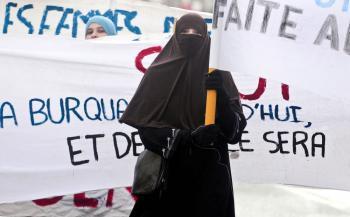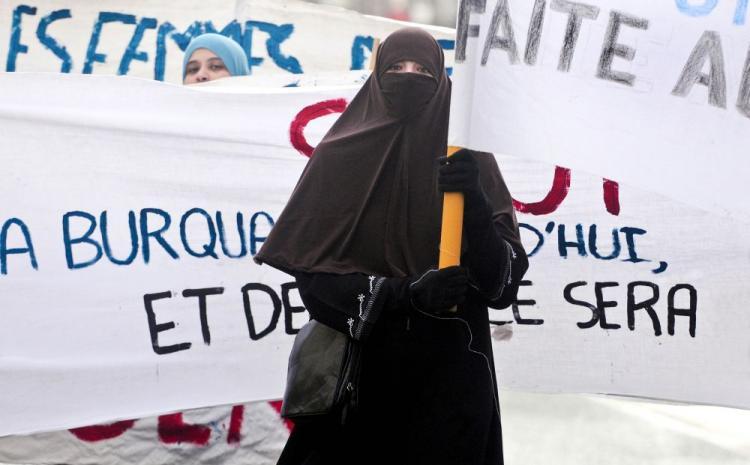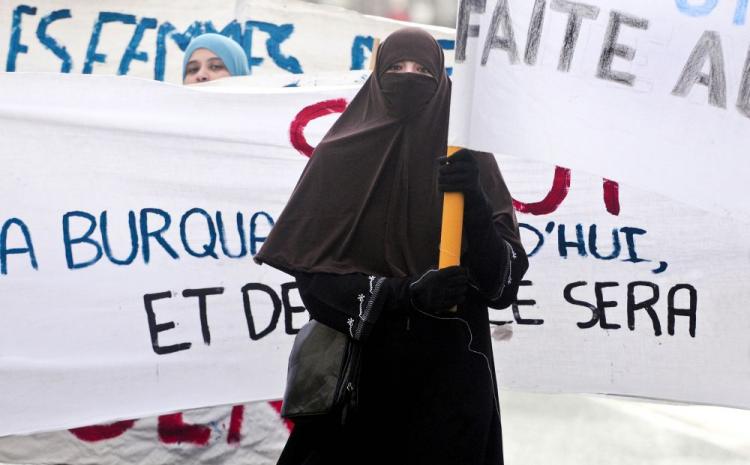PARIS—A law to prohibit the wearing of burqa and niqab muslim head coverings in public places was voted on by Belgian MPs of the Interior Affairs Committee of the Belgian Parliament on March 31.
The vote was unanimous, with not a single voice against the proposal. This could soon make Belgium the first European country to ban controversial clothes considered to be a sign of women’s alienation and a threat to public security.
The Belgian law proposal sets that any person found in any public area “with a covered or dissimulated face, partially or completely, in a way that does not allow proper identification” will face a 15 to 25 euro fine, plus potentially seven days in jail, reports Belgian newspaper Le Soir. Motorcyclists and firemen will hopefully benefit from exemption.
Belgian MPs argued that the law was needed for two key reasons: public security, and the defense of women’s dignity. Liberal MP Daniel Bacquelaine, explained to Le Figaro newspaper in France that “as in the case of dwarf tossing, even if used on a voluntary basis, burqa is insulting women’s dignity, it is a walking prison.”
Christian Democrats of the CD&V Party also obtained that in cases where Belgian justice would decide not to fine offenders, cities and district authorities would be entitled to issue fines.
Green Party “Ecolo” was the only political group to express disagreement on the form, but still said “Yes” to the law proposal. Ecolo asked for more internal consultation with Belgium State Council to ensure that the law would not violate the Belgian Constitution or potentially be attacked by the European Court of Human Rights.
Vincent de Coorebyter, a Belgian political scientist expressed doubts to Le Figaro that the law was really needed. According to Coorebyter, city-level regulations already prohibit in several cities wearing such covering clothes. “Some have therefore questioned the need to draft a law, and even more since the phenomenon relates to but a few hundred women.”
A plenary session of the Belgian Parliament is expected to validate the law’s text before the end of April. From there, Belgian law-keepers will have the difficult task of ensuring that Muslim women do not present themselves in shops or in the streets wearing a burqa. Le Soir already points out that an unbiased application of the law will also mean that spouses of Arab emirates princes staying in Brussels’s luxury hotels will also have to comply.
A comparable law could be voted for in France also, yet it has not received consensus among political parties. French State Council announced on March 30 that such a law could very likely betray the spirit of the French Constitution and be only supported by a weak legal root.
The vote was unanimous, with not a single voice against the proposal. This could soon make Belgium the first European country to ban controversial clothes considered to be a sign of women’s alienation and a threat to public security.
The Belgian law proposal sets that any person found in any public area “with a covered or dissimulated face, partially or completely, in a way that does not allow proper identification” will face a 15 to 25 euro fine, plus potentially seven days in jail, reports Belgian newspaper Le Soir. Motorcyclists and firemen will hopefully benefit from exemption.
Belgian MPs argued that the law was needed for two key reasons: public security, and the defense of women’s dignity. Liberal MP Daniel Bacquelaine, explained to Le Figaro newspaper in France that “as in the case of dwarf tossing, even if used on a voluntary basis, burqa is insulting women’s dignity, it is a walking prison.”
Christian Democrats of the CD&V Party also obtained that in cases where Belgian justice would decide not to fine offenders, cities and district authorities would be entitled to issue fines.
Green Party “Ecolo” was the only political group to express disagreement on the form, but still said “Yes” to the law proposal. Ecolo asked for more internal consultation with Belgium State Council to ensure that the law would not violate the Belgian Constitution or potentially be attacked by the European Court of Human Rights.
Vincent de Coorebyter, a Belgian political scientist expressed doubts to Le Figaro that the law was really needed. According to Coorebyter, city-level regulations already prohibit in several cities wearing such covering clothes. “Some have therefore questioned the need to draft a law, and even more since the phenomenon relates to but a few hundred women.”
A plenary session of the Belgian Parliament is expected to validate the law’s text before the end of April. From there, Belgian law-keepers will have the difficult task of ensuring that Muslim women do not present themselves in shops or in the streets wearing a burqa. Le Soir already points out that an unbiased application of the law will also mean that spouses of Arab emirates princes staying in Brussels’s luxury hotels will also have to comply.
A comparable law could be voted for in France also, yet it has not received consensus among political parties. French State Council announced on March 30 that such a law could very likely betray the spirit of the French Constitution and be only supported by a weak legal root.







